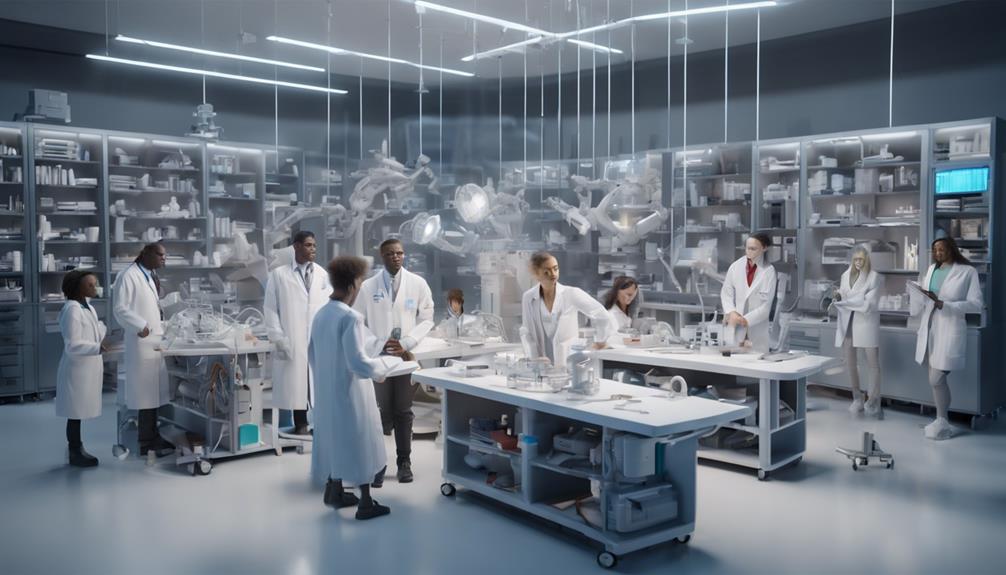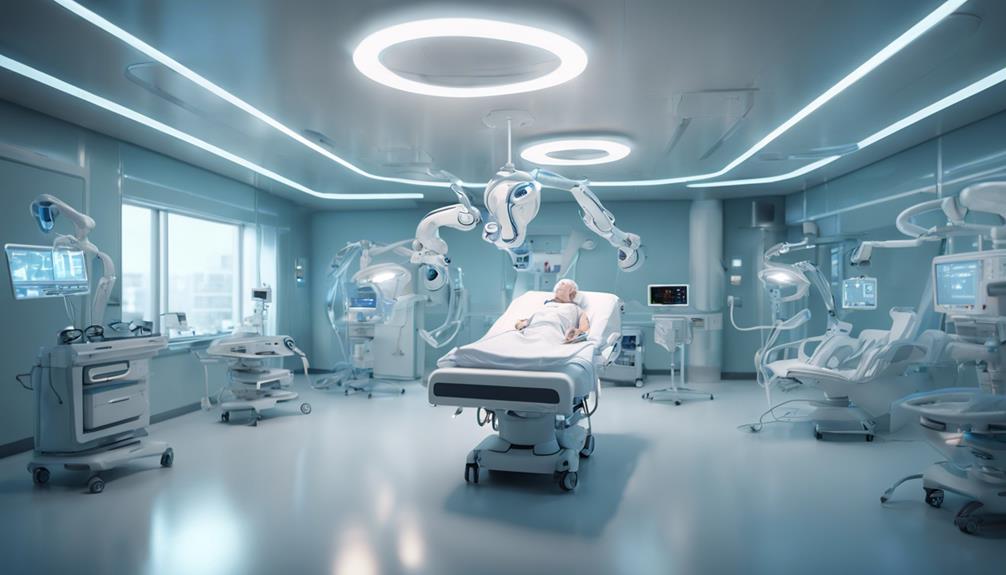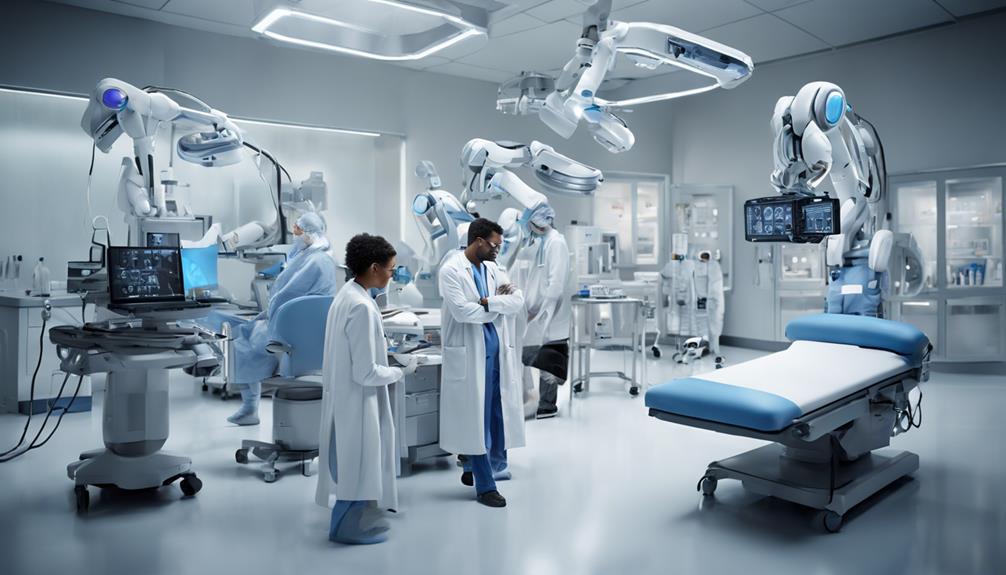
Medical technology is a great major if you're interested in a career that blends healthcare with cutting-edge technology. You'll gain essential skills, diving into biology, chemistry, and tech, preparing you to develop innovations that save lives. With diverse job opportunities in hospitals, biotech firms, and more, and a robust demand for skilled professionals, it's a field where you can truly make an impact. Salaries are competitive, reflecting the importance and complexity of the work. The rapid advancement in medical technologies ensures a dynamic career with continuous learning and growth opportunities. There's much more to consider that might influence your decision.
Understanding Medical Technology

Medical technology involves studying and applying various tools and techniques that diagnose, treat, and prevent diseases. As you delve deeper into this field, you'll encounter a dynamic blend of biology, chemistry, and technology that equips you with the skills to develop life-saving innovations. It's not just about working in labs; it's about being at the forefront of medical advancements.
When you choose to study medical technology, you're setting yourself up to understand complex diagnostic tools and how they can be used to monitor the health of patients. You'll learn how to perform and interpret a variety of tests that help in the detection of pathogens, the measurement of important biomarkers, and the analysis of genetic data.
This major also offers hands-on experience with cutting-edge technology. You'll get familiar with the latest imaging devices, automated systems, and molecular techniques that are transforming healthcare. By integrating these tools with clinical practices, you ensure that patient care isn't only effective but also efficient.
Studying medical technology also sharpens your problem-solving skills. You'll often find yourself troubleshooting equipment or refining processes to improve outcomes. This analytical aspect can be incredibly rewarding as you contribute directly to enhancing patient care.
Career Prospects in MedTech
Exploring a career in MedTech opens up a world of opportunities, from innovative biotech firms to cutting-edge hospital roles. As a MedTech graduate, you'll find doors swinging wide across various sectors, not just in direct healthcare settings. Think about the broader landscape, including medical equipment companies, research institutions, and even roles in government agencies that regulate medical technologies.
You'll be at the forefront of innovation, developing or improving medical diagnostics, devices, and treatments. You might work on projects like wearable health monitors, advanced imaging equipment, or robotic surgical tools. These aren't just futuristic concepts; they're real products and services that improve or save lives every day.
The demand for skilled professionals in this field is robust and growing due to the rapid advancement of medical technologies and an aging population that requires more healthcare services. You could be designing the next big breakthrough in patient care or ensuring the quality and safety of critical health devices.
Moreover, the diversity of roles means you can find a niche that perfectly matches your interests and skills, whether that's hands-on engineering, clinical trials, or product management. Each path offers its unique blend of challenges and rewards, making MedTech an exciting and fulfilling field to delve into.
Educational Requirements

To enter the field of MedTech, you'll need a solid educational foundation in both technology and healthcare. Typically, this starts with a bachelor's degree in medical technology, biomedical engineering, or a related field. Your coursework will cover a range of subjects, including biology, chemistry, physics, and mathematics, alongside specialized classes in diagnostics, medical instrumentation, and design.
You'll also dive into hands-on training through lab courses and internships, which are crucial for gaining practical experience. These opportunities allow you to apply theoretical knowledge in real-world settings, an essential aspect of your training.
Furthering your education with a master's degree can enhance your expertise and may be necessary for advanced positions in research or management. Such programs focus more on specific technologies, product development, and regulatory issues in the healthcare industry.
Certifications can also bolster your credentials. Depending on your career goals, you might pursue certification in areas like clinical laboratory science or medical equipment technology. These certifications often require passing an exam and completing continuing education to maintain your status.
Potential Salary Ranges
Considering a career in Medical Technology can lead to diverse salary ranges, depending on your specialization and experience. If you're leaning toward becoming a clinical laboratory technician, you might start with an annual salary around $54,000. However, with further specialization and years of experience, you could see that number climb significantly.
Diving deeper into more specialized roles, such as a biomedical engineer, you might find starting salaries closer to $65,000. These roles often require a bit more education, but they also offer the potential for higher earnings, particularly as you gain expertise and take on more complex projects.
It's important to consider the type of setting you'll be working in as well. Positions in hospitals or private medical practices can offer different salary prospects compared to roles in research labs or the pharmaceutical industry. For example, med techs in hospital settings generally earn around $60,000 to $70,000, but those in research and development might earn a bit more, given the demand for innovative solutions in these areas.
Impact on Healthcare Innovation

Medical technology majors significantly influence healthcare innovation by developing new tools and methods that improve patient care. As you delve into this field, you'll discover that your work isn't just about the gadgets themselves but also about how these innovations can transform lives.
You'll be at the forefront of designing equipment that diagnoses diseases faster and more accurately than ever before. Imagine being part of a team that develops a new imaging device that could detect early signs of cancer, or crafting software that helps predict patient outcomes using AI.
Your contribution doesn't stop at creation; it extends to the implementation of these technologies in hospitals and clinics worldwide. This means not only enhancing the capabilities of healthcare professionals but also increasing the accessibility of high-quality medical care in underserved areas.
You'll see the direct impact of your work as it leads to quicker recoveries and lower healthcare costs. Moreover, your innovations could lead to less invasive procedures, reducing both the risks associated with surgeries and the recovery time for patients.
Each advancement you contribute to can significantly shift current medical practices, pushing the entire field of healthcare towards more efficient, effective, and compassionate care.
Key Skills for Success
Developing a robust set of skills is essential for thriving in the field of medical technology. You'll need a solid foundation in both the sciences and technology. Mastery of biology, chemistry, and physiology is crucial, as you'll often need to understand the complex biological processes that technology aims to address or enhance.
But it doesn't stop there; you'll also need to be proficient in technical skills, including data analysis and engineering principles, to develop and improve medical devices and diagnostics.
Strong analytical skills are another must-have. You'll frequently analyze data and interpret results to ensure devices operate safely and effectively. This includes problem-solving skills, which allow you to identify issues and think critically about solutions under pressure.
Communication is key in this field. You'll need to explain complex technical information to non-experts, including healthcare providers and patients, ensuring they understand how to use new technologies safely and effectively.
Teamwork is equally important, as you'll often work in multidisciplinary teams to bring new innovations to life.
Lastly, don't underestimate the importance of continual learning. Medical technology evolves rapidly, and staying updated with the latest advancements and technologies is essential for your success and ongoing relevance in the field.
Challenges in the Field

While mastering key skills sets you up for success, you'll also face several challenges in the field of medical technology. One significant hurdle is the rapid pace of technological advancements. You'll need to stay updated with the latest developments, which can be both time-consuming and overwhelming. Moreover, the complexity of modern medical devices demands a deep understanding of both hardware and software, increasing the learning curve.
Another challenge is dealing with the stringent regulatory environment. As a med tech professional, you'll navigate through complex regulations that ensure safety and efficacy of medical devices. Compliance is critical, and any oversight can lead to serious legal and ethical consequences.
You'll also encounter the high pressure of working in environments where mistakes can have serious implications. Accuracy is paramount, and the stress of ensuring that devices function perfectly in critical medical situations can be daunting.
Furthermore, collaboration is key in this field, and you might find it challenging to communicate effectively with multidisciplinary teams including engineers, healthcare professionals, and regulatory bodies. Each group has its own jargon and priorities, making effective communication essential yet sometimes difficult to achieve.
These challenges are demanding, but overcoming them can lead to a rewarding career.
Job Market Trends
As you explore a career in medical technology, it's important to understand that the job market is currently experiencing significant growth. This expansion is driven by technological advancements and an increasing need for healthcare services, especially in diagnostics and research. As the population ages and chronic diseases rise, the demand for sophisticated medical equipment and skilled professionals to operate them also increases.
You'll find that the demand for medical technologists spans various settings, from hospitals and diagnostic labs to private practices and research institutions. This diversification in the job market not only ensures more job openings but also offers you a wide array of environments to choose from, depending on your personal career preferences.
Moreover, salaries in this field are competitive, reflecting the specialized skills and knowledge that medical technologists bring to their roles. Employment stability is another key feature, given the essential nature of healthcare services. With diseases and medical conditions continuously evolving, the expertise of medical technologists remains crucial, keeping the job market resilient even during economic downturns.
Professional Growth Opportunities

You'll discover numerous opportunities for professional growth in the field of medical technology. As you delve into this dynamic sector, you'll find that continuous advancements in technology and healthcare practices not only demand your initial expertise but also foster an environment where ongoing learning is both necessary and rewarded.
You're likely to engage in regular training sessions, certifications, and possibly even further education, which can propel your career to higher levels, opening doors to supervisory or specialized roles within laboratory settings, research institutions, or corporate sectors.
Moreover, the diversity of work environments—from hospitals and private labs to biotech firms—means you'll have the chance to develop a wide array of skills and experiences. Each setting offers unique challenges and learning opportunities, ensuring that your job remains stimulating and that you're continuously improving your capabilities. Networking within these environments can also lead to mentorships and collaborations that further your professional development.
As you gain experience, you might also transition into roles that involve more responsibility, such as managing teams or leading projects. This not only enhances your resume but also sharpens your leadership and problem-solving skills, making you a valuable asset in this ever-evolving field.
Making the Final Decision
Considering the numerous professional growth opportunities in medical technology, deciding whether it's the right major for you involves weighing several factors. You'll need to assess your interest in science and technology, your ability to handle rigorous coursework, and your long-term career goals. It's a field that requires a strong commitment to learning and professional development.
Think about your personal interests and strengths. Are you fascinated by the latest advances in healthcare and passionate about making a difference in patients' lives? Medical technology is a rapidly evolving industry; staying curious and eager to learn is crucial.
You should also consider the practical aspects, such as the availability of programs at your preferred colleges and potential job opportunities in your area or abroad.
Frequently Asked Questions
How Does Medical Technology Affect Patient Privacy and Data Security?
Medical technology can compromise your patient privacy and data security if not properly managed. You're at risk of data breaches and unauthorized access, so it's crucial to ensure robust security measures are in place.
What Ethical Considerations Are Prevalent in the Medical Technology Field?
You'll find that ethical considerations in medical technology often include patient consent, data privacy, and the potential for technology misuse. Balancing innovation with these ethical challenges is crucial for responsible development and application.
Are There Online Degree Programs Available in Medical Technology?
Yes, you can find online degree programs in medical technology. They offer flexibility and can be a great option if you're looking to balance work, family, or other commitments while studying.
How Do Med Tech Professionals Maintain Work-Life Balance?
As a med tech professional, you'll maintain work-life balance by setting strict boundaries, prioritizing tasks, and utilizing time management skills. It's also crucial to make time for relaxation and personal activities.
What Role Do Medical Technologists Play in Global Health Crises?
As a medical technologist, you're crucial in global health crises, conducting essential tests that guide treatment strategies and track outbreaks, directly impacting patient care and public health decisions during emergencies.
Conclusion
So, are you considering a major in medical technology? It's a smart move!
With its promising career prospects, competitive salaries, and key role in healthcare innovation, MedTech offers a dynamic field to enter.
Despite some challenges, the sector is growing, providing substantial opportunities for professional growth.
If you're passionate about making a difference in healthcare and eager to embrace continuous learning, diving into medical technology could be the perfect choice for you.
Ready to make a mark?






